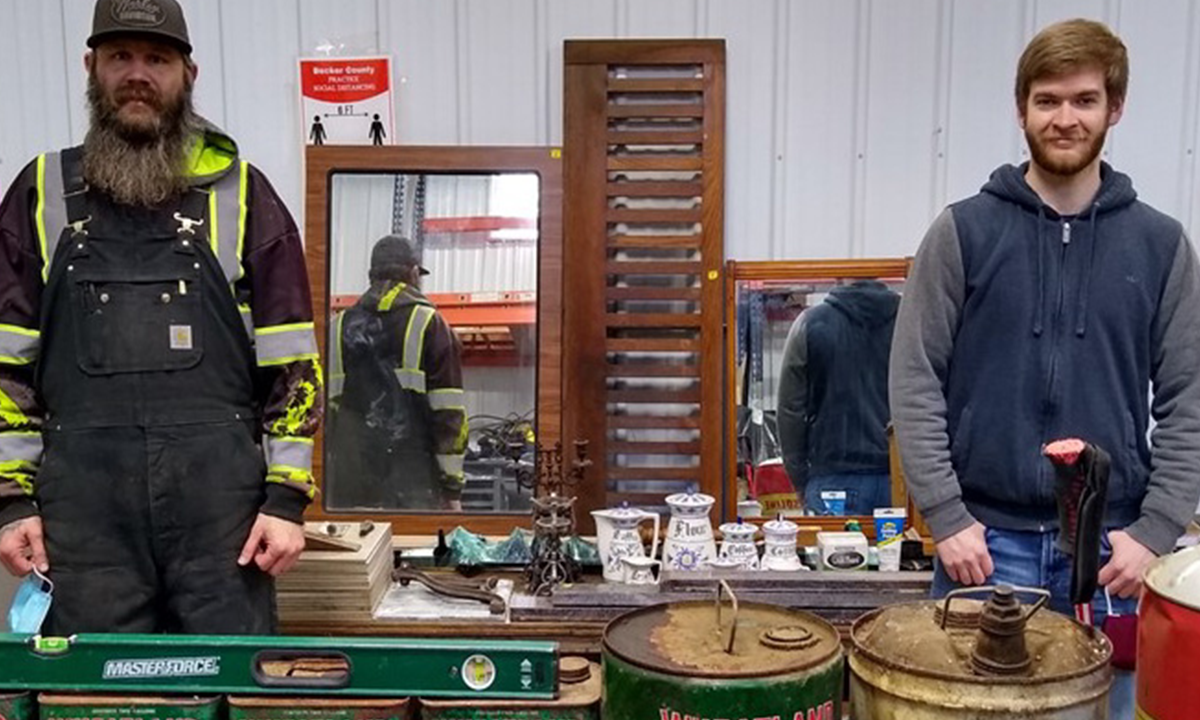Becker County, with its partners Better Futures Minnesota and the Natural Resources Research Institute at the University of Minnesota – Duluth, partnered to divert household goods and building materials from the landfill.
Each year, Becker County residents and businesses throw away hundreds of tons of material, but some of this material still has a useful life or can be reused for a new purpose. By diverting reusable materials at this transfer station, the County is reducing its landfill and hauling costs, creating new jobs, and reducing harmful emissions from the environment.
Better Futures Minnesota serves men who are often marginalized from society and typically cycle through costly public institutions as a result. The pilot program embodies principles of the circular economy while also creating jobs for individuals who face significant barriers to employment.
Better Futures Minnesota’s waste diversion and reuse pilot with Becker County included two sale events where materials diverted from the waste stream were offered to local citizens for purchase. More than 300 diverted items were sold between the two sales generating more than $2,700 in revenue. In total, more than three tons of waste was saved from entering the landfill.
Support this Project
Better Futures and Becker County Pilot's Interview
The Better Futures-Becker County project excels with well-defined and measurable impacts in environmental as well as human terms. The project’s broad partnership has embraced an innovative approach to addressing an environmental issue common across Minnesota and, in doing so, has developed a model with potential to scale to other communities. Between its positive impact on the environment and its emphasis on addressing racial inequities faced in Rural Minnesota, this outstanding project reduces waste and improves lives at the same time.
Honorable Mention
RISE Together 2021: A Movement Dedicated to Empowerment and Learning
Resilient Indigenous Sisters Engaging, or RISE, (with Allies) was founded in 2019 by a small group of women in Northern Minnesota. Nookomis (Grandmother) Debra Topping, Gaagigeyaashiik (Everlasting Wind) Dawn Goodwin and Nancy Beaulieu are the three Anishinaabe women who co-organize the group, representing three northern tribes: Fond du Lac, White Earth and Leech Lake, respectively.
All of the movements RISE has initiated or is in the process of initiating lead to allowing trees to grow again and rivers to thrive and flourish, giving Anishinaabe communities a space to heal and a time to come together with white settlers for healing, allowing the opportunity for new communities to be built, having land on which to grow food, and helping Native people be safe and healthy.
Consistently, this group of women works toward eliminating barriers to participation that they’ve experienced as a historically under-represented and marginalized community. To date, RISE’s biggest accomplishment has been the creation of Manoomin Genawendang Endazhigabeshing or Wild Rice Protectors’ Camp. Offering a space for prayer and where water protectors gather. Protecting water is one element of everything our Native relatives do to protect and maintain their relationship with all of Nature.
About the Rural Vitality Category
The Rural Vitality Award recognizes a partnership working to solve community-scale environmental challenges in rural areas. The recognition may include grassroots efforts in revitalization or beautification; alternative land use strategies; convening partners to facilitate community understanding across racial and ethnic difference; or policy initiatives contributing to economic prosperity, environmental stewardship, and social justice for an improved quality of rural life.
